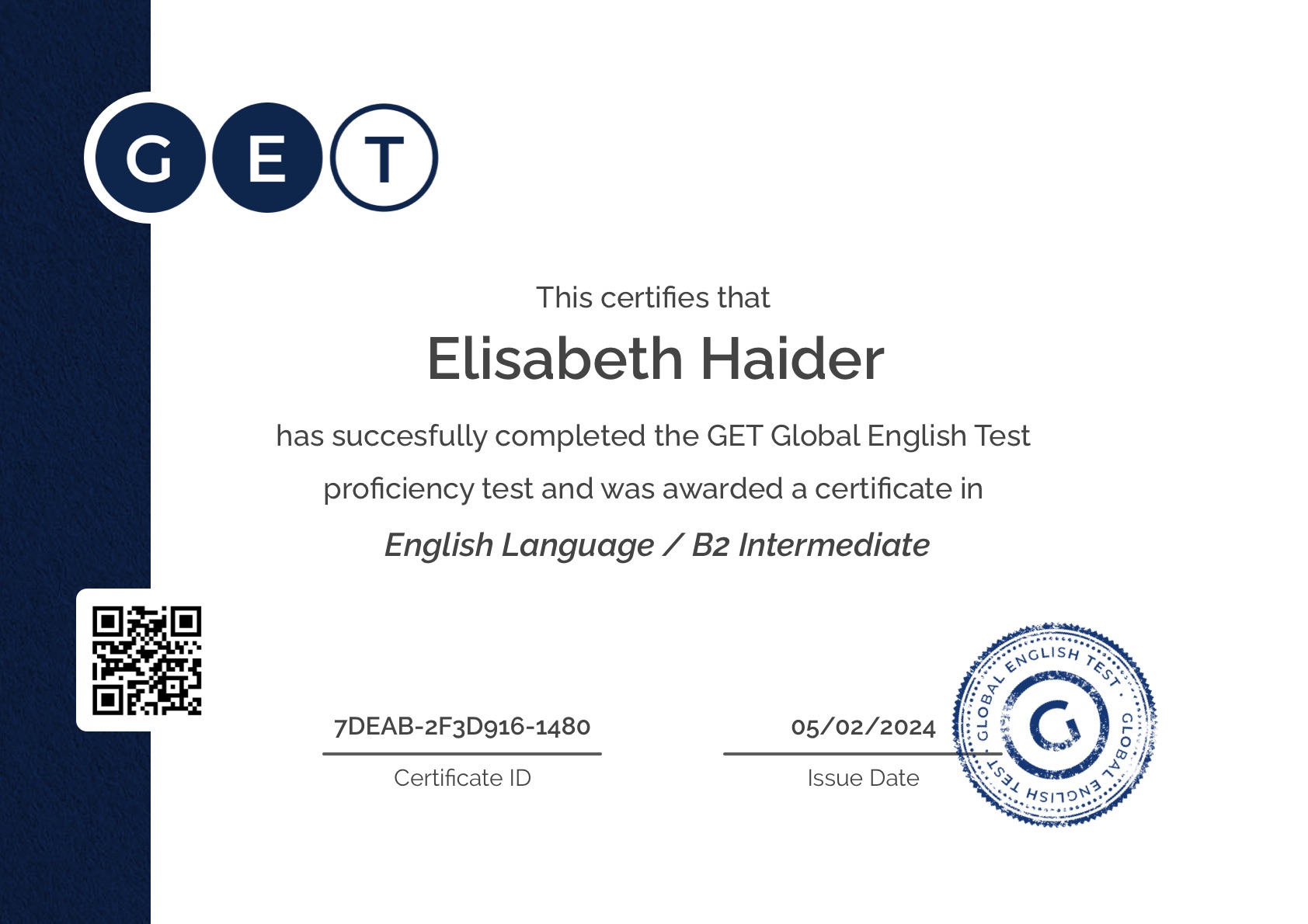
B2 English Level (Intermediate)
The B2 English level, commonly referred to as “Intermediate,” represents a stage in language proficiency where individuals have developed beyond basic proficiency and can communicate effectively in a wide range of situations.
-
You can share opinions on various topics; politics, social issues etc.
-
B2 English Level can talk about cultural interests; art, literature, music
-
You can discussing favorite books, movies, TV shows
What is B2 English Level (Intermediate)?
Individuals at the B2 level can effectively express themselves, engage in debates and discussions, and understand complex ideas and arguments. They have a wide range of vocabulary and can use a variety of language structures with relative fluency and accuracy.

Key characteristics of the B2 English level (Intermediate):
Speaking Skills
Individuals at the B2 level can engage in conversations on a variety of topics and express opinions, preferences, and experiences with relative ease. They can also participate in discussions, debates, and presentations on familiar and unfamiliar topics.
Listening Skills
They can understand the main ideas and key details in spoken English on a wide range of topics, including formal presentations, lectures, radio broadcasts, and conversations among native speakers. They can follow complex arguments and discussions and understand various accents and speech patterns.
Reading Skills
They can read and understand a variety of texts such as articles, reports, essays, and fiction on a wide range of topics. They can extract relevant information, understand the main ideas and supporting details, and analyze the text for deeper meaning and context.
Writing Skills
They can write clear, coherent, and well-organized texts such as essays, reports, reviews, and formal letters on a variety of topics. They can express ideas, arguments, and opinions effectively, use appropriate vocabulary and grammar, and adapt their writing style to different audiences and purposes.
Vocabulary and Grammar
They have a wide range of vocabulary and can use idiomatic expressions, phrasal verbs, and colloquial language appropriately in context. They have a solid understanding of grammar and can use a variety of complex grammatical structures accurately and effectively.
Social and Functional Language
They can engage in social interactions such as greetings, introductions, and small talk with ease. They can also navigate a wide range of social situations, express empathy, negotiate, and resolve conflicts effectively in both formal and informal contexts.
Overall, individuals at the B2 English level have developed intermediate proficiency and can communicate fluently and confidently in English in a variety of contexts. They are able to understand and produce complex language, engage in meaningful interactions, and participate effectively in academic, professional, and social settings.
Test your English level now
Answer 40 questions and find out your English language level comfortably.

An A1 English Level Certificate. Start the test to get yours now!
Listen to a B2 English Level Speaker
Play the audio recording below to listen to an example of a conversation by someone speaking English at a B2 level.
What can B2 English Level (Intermediate) Do?
ndividuals at the B2 English level, also known as “Intermediate,” have developed solid proficiency in English and can perform a variety of tasks with relative ease. Here are some key abilities and tasks that someone at the B2 level can typically accomplish:
Engage in Fluent Conversations
They can engage in fluent and natural conversations on a wide range of topics, express opinions, and share experiences with ease. They can also participate in discussions, debates, and presentations on both familiar and unfamiliar topics.
Understand Complex Spoken English
They can understand the main ideas and key details in complex spoken English, including formal presentations, lectures, radio broadcasts, and conversations among native speakers. They can follow complex arguments, understand various accents, and grasp implied meanings.
Read and Analyze Various Texts
They can read and understand a variety of texts such as articles, reports, essays, and fiction on diverse topics. They can extract relevant information, comprehend main ideas and supporting details, and analyze the text for deeper meaning and context.
Write Coherent and Well-Structured Texts
They can write clear, coherent, and well-organized texts such as essays, reports, reviews, and formal letters on a wide range of topics.
Use Advanced Vocabulary and Grammar
They have a wide range of vocabulary and can use idiomatic expressions, phrasal verbs, and colloquial language appropriately in context.
Navigate Social and Professional Situations
They can engage in social interactions such as greetings, introductions, and small talk with ease. They can also navigate a wide range of social and professional situations, express empathy, negotiate, and resolve conflicts effectively in both formal and informal contexts.
Overall, individuals at the B2 English level are able to understand and produce complex language, engage in meaningful interactions, and participate effectively in academic, professional, and social settings.

What Can B2 English Level (Intermediate) Read?
At the B2 English level, individuals have developed intermediate proficiency and can read a wide range of texts with comprehension. Here are some examples of the types of materials that someone at the B2 level can read:
Articles and Essays
They can read and understand articles and essays on a variety of topics such as current events, science, technology, arts, culture, and lifestyle. They can extract main ideas, identify key details, and grasp the author’s arguments and opinions.
Short Stories and Novels
They can read short stories and novels written for intermediate-level readers. They can follow the plot, understand character development, and analyze themes and literary techniques used by the author.
Academic Texts
They can read academic texts such as textbooks, research papers, and scholarly articles on subjects within their field of study or interest. They can comprehend complex ideas, theories, and methodologies and understand specialized vocabulary and terminology.
Reports and Analyses
They can read and understand reports, analyses, and summaries on various topics such as market trends, economic indicators, scientific findings, and social issues. They can extract relevant information, analyze data, and draw conclusions from the text.
Instruction Manuals and Guides
They can read and understand instruction manuals, user guides, and technical documents for a variety of products and services. They can follow step-by-step instructions, understand diagrams and illustrations, and troubleshoot problems as needed.
News and Media:
They can read news articles, opinion pieces, and editorials from reputable sources such as newspapers, magazines, and online news websites. They can stay informed about current events, understand different perspectives, and evaluate the credibility of sources.
Overall, individuals at the B2 English level have developed intermediate proficiency and can read and comprehend a wide range of texts on diverse topics. They can engage with written materials effectively, extract relevant information, and analyze and evaluate content critically.
Test your English level now
Answer 40 questions and find out your English language level comfortably.

B2 English Level (Intermediate) Spaeaking Skills
At the B2 English level, individuals have developed intermediate proficiency and can engage in fluent and nuanced conversations on a variety of topics. Here are some key characteristics of how someone at the B2 level can talk:
Expressing Opinions and Ideas
They can express opinions, ideas, and viewpoints confidently and articulately. They can support their opinions with relevant examples and arguments, and they can engage in discussions and debates with ease.
Discussing Past Experiences
They can talk about past experiences, events, and activities using a variety of verb tenses (e.g., past simple, present perfect). They can describe what they did, where they went, and who they were with in detail.
Talking about Future Plans
They can discuss future plans, intentions, and aspirations using future tenses (e.g., going to, will). They can talk about what they want to do, where they want to go, and what they hope to achieve.
Narrating Stories and Anecdotes
They can narrate stories, anecdotes, and personal experiences with fluency and coherence. They can structure their narratives effectively, use descriptive language to create vivid imagery, and engage their listeners’ attention.
Asking Questions and Seeking Clarifications
They can ask questions to seek clarification, gather information, or express interest in a topic. They can use a variety of question forms (e.g., Wh-questions, Yes/No questions) appropriately and effectively.
Engaging in Small Talk and Social Interactions
They can engage in small talk and social interactions comfortably and naturally. They can initiate and maintain conversations with others, exchange pleasantries, and show interest in others’ experiences and opinions.
Expressing Agreement and Disagreement
They can express agreement and disagreement diplomatically and respectfully. They can use a variety of expressions and phrases (e.g., I see your point, I understand where you’re coming from) to convey their stance effectively.
Using Idioms and Colloquial Expressions
They can incorporate idiomatic expressions, colloquialisms, and phrasal verbs into their speech to add variety and expressiveness. They can use these expressions appropriately in context to enhance their communication.

How can I improve B2 English level (Intermediate) language skills?
Individuals at the B2 English level, also known as “Intermediate,” can continue to develop their language skills by incorporating various strategies into their learning routine. Here are some effective ways for B2 English level learners to further enhance their language proficiency:
Here is your list to improve your B2 English Level (Intermediate)
- Expand Vocabulary: Continuously expand your vocabulary by learning new words and phrases related to different topics, contexts, and interests. Use a variety of resources such as vocabulary books, flashcards, online words.
- Read Widely: Read a wide range of materials in English, including books, articles, newspapers, blogs, and magazines. Choose topics that interest you and challenge yourself with more complex texts. Pay attention to new vocabulary, sentence structures, and idiomatic expressions.
- Listen Actively: Listen to various forms of spoken English, such as podcasts, radio programs, audiobooks, and TED talks. Focus on understanding different accents, speech patterns, and intonations. Take notes on key ideas, vocabulary, and pronunciation while listening.
- Practice Speaking Regularly: Find opportunities to speak in English with native speakers, language exchange partners, classmates, or tutors. Participate in conversation clubs, discussion groups, or online forums to practice speaking in a supportive environment.
- Write Frequently: Practice writing in English regularly to improve grammar, vocabulary, and writing style. Keep a journal, write essays, stories, or blog posts, and participate in writing challenges or competitions.
- Use Language Learning Apps and Websites: Take advantage of language-learning apps and websites that offer interactive exercises, quizzes, games, and lessons tailored to your proficiency level.
- Seek Immersion Opportunities: Watch English-language movies and TV shows, listen to English music and podcasts, and engage with English-speaking communities online and offline.
- Set Specific Goals: Set specific language learning goals to track your progress and stay motivated.
- Review and Reflect: Regularly review and reflect on your language learning progress. Keep track of your vocabulary, grammar, and speaking and writing skills to monitor improvement over time.
By incorporating these strategies into their language learning routine, individuals at the B2 English level can continue to develop their language skills, increase their fluency, and progress toward higher levels of proficiency in English.
What are B2 English Level (Intermediate) Daily Idioms?
At the B2 English level, individuals may encounter a variety of idiomatic expressions in everyday conversations. These idioms add color and nuance to language, helping speakers express themselves more fluently. Here are some examples of daily idioms suitable for B2 English level:
B2 English Level Idioms List with Examples
- Jump on the bandwagon: To join a popular trend or activity.
Example: “After seeing all my friends try the new workout craze, I decided to jump on the bandwagon and give it a try.” - Pull someone’s leg: To tease or joke with someone in a playful manner.
Example: “Are you serious, or are you just pulling my leg?” - A blessing in disguise: Something that initially seems bad or unlucky but turns out to be beneficial in the long run.
Example: “Losing my job was a blessing in disguise because it pushed me to pursue my passion for writing.” - Burn bridges: To damage relationships or cut off ties with people, usually by behaving in a way that is disrespectful or unfriendly.
Example: “I wouldn’t burn bridges with your colleagues, even if you’re leaving the company. You never know when you might need their help in the future.” - Hold your horses: To ask someone to be patient or wait before taking action.
Example: “Hold your horses! Let’s hear everyone’s opinions before making a decision.” - By the skin of your teeth: To narrowly succeed or avoid failure.
Example: “I managed to catch the last train home by the skin of my teeth.” - Turn over a new leaf: To start behaving in a better or more positive way, often after making a decision to change one’s habits or lifestyle.
Example: “After going through a rough patch, he decided to turn over a new leaf and focus on his health and well-being.” - Beat around the bush: To avoid discussing a topic directly or to speak evasively.
Example: “Stop beating around the bush and tell me what you really think about the proposal.” - Call it a day: To decide to stop working or stop doing something, usually because enough has been accomplished.
Example: “We’ve been working on this project for hours. Let’s call it a day and continue tomorrow.” - Get cold feet: To feel nervous or anxious about doing something, especially before a big decision or event.
Example: “I was planning to ask her out, but I got cold feet at the last minute.”
Test your English level now
Answer 40 questions and find out your English language level comfortably.

How many words should you know for B2 Level English (Intermediate)?
For the B2 Level English, also known as “Intermediate,” individuals should aim to have a vocabulary of approximately 2,500 to 5,000 words. This vocabulary range allows them to communicate effectively in a wide range of situations and handle various topics with relative ease.
At the B2 level, learners should focus on expanding their vocabulary beyond basic everyday words to include more specific and nuanced terms related to different domains such as work, leisure activities, hobbies, travel, and social interactions. Additionally, learners should aim to acquire vocabulary related to more complex grammatical structures and expressions used in conversations, reading, writing, and listening at the intermediate level.
B2 English Level (Intermediate) Word List
- Common Vocabulary: Words commonly used in various contexts, including everyday conversations, reading, and writing. This includes vocabulary related to:
- Personal information (e.g., name, age, address).
- Family and relationships (e.g., mother, father, friend, partner).
- Daily activities and routines (e.g., work, study, leisure activities).
- Food and drink (e.g., fruits, vegetables, beverages).
- Places and directions (e.g., city, street, directions).
- Travel and transportation (e.g., airport, train, ticket).
- Health and well-being (e.g., symptoms, treatments, exercise).
- Academic and Professional Vocabulary: Words relevant to academic study, work environments, and specialized fields of knowledge. This includes vocabulary related to:
- Education and learning (e.g., school, university, degree).
- Employment and careers (e.g., job, interview, resume).
- Business and finance (e.g., company, profit, investment).
- Science and technology (e.g., innovation, research, development).
- Law and politics (e.g., government, policy, legislation).
- Arts and culture (e.g., literature, music, theater).
- Idioms, Phrasal Verbs, and Collocations: Understanding and using idiomatic expressions, phrasal verbs, and common collocations is important for achieving natural and fluent language use. This includes:
- Idioms (e.g., “kick the bucket,” “break the ice,” “piece of cake”).
- Phrasal verbs (e.g., “take off,” “put up with,” “go through”).
- Collocations (e.g., “make a decision,” “take a break,” “give an opinion”).
- Grammar Structures and Syntax: Mastery of grammar structures and sentence patterns is crucial for effective communication. This includes:
- Verb tenses (e.g., present simple, past continuous, future perfect).
- Conditional sentences (e.g., zero, first, second, third conditionals).
- Reported speech (e.g., direct and indirect speech).
- Modals (e.g., can, could, may, might, must, should).
- High-Frequency Words and Academic Vocabulary: Words that frequently appear in spoken and written English across various contexts. This includes:
- Common nouns, verbs, adjectives, and adverbs.
- Academic vocabulary relevant to reading comprehension and writing tasks.
English Test Questions and Answers for B2 English Level (Intermediate)
Short B2 English Level (Intermediate) Test and Answers
What Jobs Can CEFR B2 English Speakers Do?
If you’ve achieved a B2 level in English, congratulations! At this stage, you are considered an upper-intermediate speaker, capable of communicating effectively in both professional and social contexts. The CEFR B2 level equips you with the skills to work in various industries where English proficiency is a requirement.
In this part, we’ll explore job opportunities for CEFR B2 English speakers, covering roles across multiple sectors and tips to advance your career even further.
With B2-level English, you can work in roles that require strong communication skills, complex problem-solving, and the ability to interact with clients, colleagues, and management.
Jobs Suitable for CEFR B2 English Speakers
1. Office Manager
As a B2 English speaker, you are well-suited for roles like office manager, where strong communication skills are essential. In this role, you’ll manage office operations, coordinate meetings, handle internal communication, and manage correspondence. Your ability to speak and write in English fluently will allow you to work efficiently with both local and international teams.
2. Sales Executive
In the role of a sales executive, your B2-level English will be crucial in negotiating deals, building relationships with clients, and explaining product details to both local and international customers. Whether in a business-to-business (B2B) or business-to-consumer (B2C) environment, your language proficiency will enable you to present confidently and close sales effectively.
3. Marketing Specialist
A marketing specialist position is ideal for B2 English speakers who are interested in managing campaigns, crafting content, and interacting with clients or customers. Your ability to produce clear, persuasive content in English—whether through writing social media posts, creating ad campaigns, or writing blog articles—will be a key asset in this role.
4. Teacher or Tutor
At the B2 level, you are qualified to work as an English tutor or teaching assistant, helping others improve their English skills. You could teach conversational English to non-native speakers or provide tutoring services to students at various educational levels. This is also a great way to practice and further develop your own language skills.
5. Content Writer
In a content writing role, B2 English speakers can write articles, blog posts, and other materials for websites or marketing purposes. You will be responsible for creating well-structured, engaging content in English. A strong command of written English is necessary to convey ideas clearly and persuasively to diverse audiences.
6. Customer Success Manager
The role of a customer success manager involves working closely with clients, understanding their needs, and helping them achieve their goals using your company’s products or services. Your B2 English proficiency will be essential for maintaining clear, detailed communication and building long-lasting relationships with customers.
Examples of Industries Hiring B2 English Speakers
1. Sales and Marketing
Sales executives, marketing managers, and customer relationship managers often require B2-level English for effective communication with clients, partners, and customers. Strong language skills are necessary for tasks like drafting proposals, negotiating contracts, and crafting marketing campaigns.
2. Education
B2 English speakers are qualified to teach English as a second language (ESL) or assist in classrooms where English is the medium of instruction. You can also work as a language tutor, helping students improve their conversational skills or prepare for exams.
3. Tourism and Hospitality
The tourism and hospitality industry offers roles for B2 speakers in positions such as tour guides, travel agents, or hotel managers. These jobs require you to interact with international clients, manage bookings, and ensure that guests have a seamless experience—all tasks that depend on clear and professional English communication.
4. Content Creation and Digital Media
Companies in content creation, advertising, or digital media frequently hire B2 English speakers to write blogs, manage social media accounts, or create video content. In these roles, strong written and verbal English skills are essential for communicating messages effectively and engaging online audiences.
5. Customer Service and Support
In customer service roles, B2 English speakers handle inquiries, resolve complaints, and assist customers via phone, email, or chat. As many companies operate in global markets, English is often the primary language for customer communication, making B2 proficiency an essential requirement.
At the B2 level of English, you have a solid foundation that opens doors to numerous career opportunities across different industries. Whether you choose to work in sales, marketing, customer service, education, or hospitality, your ability to communicate fluently and effectively in English is a major asset.
To further enhance your career, consider taking advanced English courses, focusing on business English, and expanding your industry-specific vocabulary. With continued effort, you’ll be ready to progress to even higher levels of English proficiency and career success.
- Reading Comprehension Question:
- Passage: “In recent years, the debate over the impact of social media on mental health has intensified. Some argue that social media platforms provide valuable opportunities for connection and self-expression, while others warn of the negative effects of excessive screen time and comparison-based content. Research studies have found correlations between heavy social media use and feelings of loneliness, anxiety, and depression.”
- Question: What is the main topic of the passage?
A) The benefits of social media platforms
B) The impact of social media on mental health
C) The rise of screen addiction among adolescents
D) The importance of self-expression in the digital age
- Vocabulary Question:
- Question: What does the word “prevalence” mean in the passage?
A) Importance
B) Abundance
C) Uniqueness
D) Scarcity
- Question: What does the word “prevalence” mean in the passage?
- Grammar Question:
- Question: Which sentence uses the correct verb tense?
A) She will going to the concert next week.
B) They have been studying English since they arrived.
C) He don’t like coffee, but he drinks it anyway.
D) We was planning to visit the museum yesterday.
- Question: Which sentence uses the correct verb tense?
Answers:
- B) The impact of social media on mental health
- B) Abundance
- B) They have been studying English since they arrived.

Test your English level and get your certificate!
Find out your English level
Takes only ~20 minutes 🎉
